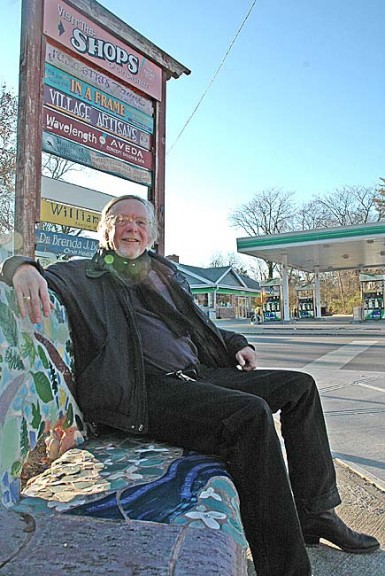Proposing an ‘Impact Hub’ in village — New entrepreneurial model
- Published: December 19, 2013
As befits one who spent his formative years at Antioch College, Roger Husbands in his life has reinvented himself, and his career, at regular intervals. After an Antioch co-op job at a federal agency where he wrote a paper on the decontamination of industrial facilities following a nuclear attack (this was the 60s), Husbands went on to become an actuarial consultant for a consulting company. He later moved to Seattle, where he opened one of the city’s first punk rock clubs (this was the 80s) and eventually managed more than 40 bands. After moving back to his Boston hometown due to his father’s illness, Husbands launched a new career as an executive coach to bankers, professors and doctors. But after a decade, frustrated by his clients’ desire for ever-escalating sums of money, Husbands moved to northern California and studied Zen and Ridhwan, a method of inquiry. He later created Cultural Imperative, a business that helps health care professionals serve diverse cultures.
“From the beginning, I’ve enjoyed creating,” Husbands said in a recent interview. “I like starting new things.”
The new thing that Husbands wants to start now is an Impact Hub in Yellow Springs. A combination of business incubator, tech center and community gathering space, the Impact Hub is a new model of small business development. And it’s a model that Husbands believes is a good fit for the village, with its activist, community-minded values and history of entrepreneurial energy.
“I see Yellow Springs as a place with independent thought, and less buy-in to the corporate establishment,” he said.
Independent thinkers are exactly the people who have been flocking to Impact Hubs across the globe since they first began in London in 2007 — currently, there are more than 40 across the globe, with 7,000 members. This year, the Seattle Hub was described in Seattle Magazine as “a vibrant, tech-savvy coworking space for companies, startups and individuals focused on the common good.” The hubs are funded partly by members’ fees, which range from about $30 yearly, allowing the member to attend activities, to about $500 yearly, allowing unlimited use of facilities, while the hub’s businesses are often funded by crowdsourcing, angel investors or venture capitalists, according to Husbands.
The working areas, which vary from city to city, tend to be large, open spaces with plenty of comfortable chairs and tables where people can brainstorm and work collaboratively. And to be accepted as a member, an applicant has to describe how his or her business idea would create social good.
For instance, at the San Francisco hub, where Husbands has been active, a young woman launched a new nonprofit she created after discovering the city had about 5,000 homeless people and only nine showers for the homeless to use. So, with the help of crowd funding, she created Lava Mae, four busses outfitted with showers that travel around the city to serve the homeless.
“She’s done amazing work,” Husbands said.
He envisions the Hub as a good fit in Yellow Springs because of the community’s twin traditions of social activism and entrepreneurial energy, which he saw firsthand while an Antioch student in the 1960s. But that energy seems diminished today, and he’d like to help bring it back.
Husbands also sees a newly revived college — he’s a member of the college Alumni Board — with many large empty buildings, such as the Sontag-Fels and Kettering buildings, that could be converted into a hub. The college supports him, according to Husbands, who recently met with college president Mark Roosevelt. Although at this point Antioch is unable to fund the effort, in a recent interview, Roosevelt emphasized that the project has college support.
To try to launch his newest endeavor, Husbands is living in Yellow Springs for three months to explore interest in the Impact Hub — he’ll be here through January. First, he’s been trying to meet people to gauge enthusiasm for the project, and has found considerable support.
“I’m finding there’s a lot of people here wondering if they can start a business, or run one,” he said. “It’s amazing, the businesses that people come up with.
Husbands’ first step is finding five people to make up a board for the Impact Hub project, with representatives from the community and from the college. The group would work to find the approximately 500 people needed to sign on as members. The hub, if it garners support, would take about a year and a half to launch, he said.
Interested persons can contact Husbands at rmh@culturalimperative.org, or 707-540-2332.
Impact Hubs are “exploding” all over the world, he said, and Husbands believes that the village, the college and the country would all benefit from another one located in Yellow Springs.
“Our economy is a mess and our social problems incredible,” Husbands said. “We need to get people together to begin to solve them.”
The Yellow Springs News encourages respectful discussion of this article.
You must login to post a comment.
Don't have a login? Register for a free YSNews.com account.
Parkinsons.jpg)














No comments yet for this article.